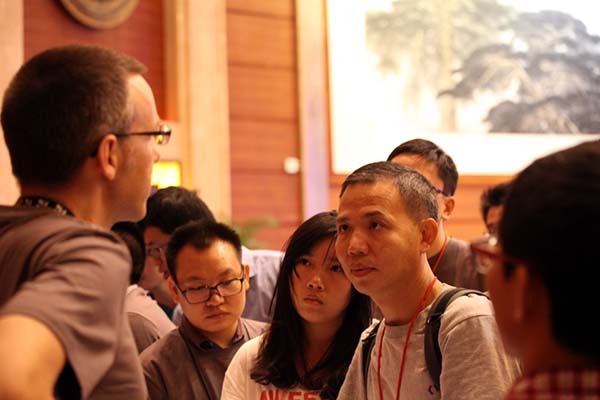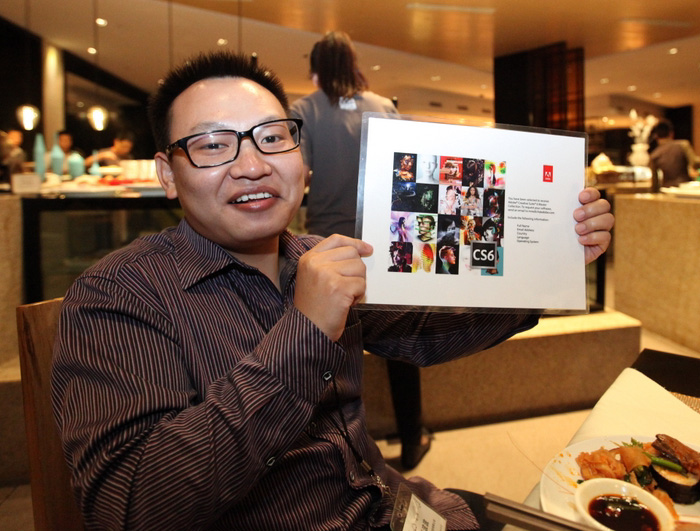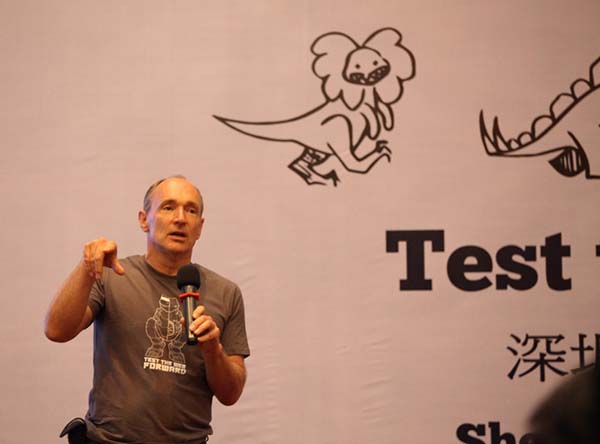Test the Web Forward Shenzhen Recap
On November 9, 2013, the eighth major Test the Web Forward event was held in Shenzhen, China. The primary goals of this event was to raise awareness of the crucial need for tests, to educate newcomers on the test creation and submission processes, and to cultivate a community of Open Web Platform contributors beyond the day of the event.
With the recent announcement of the W3C adopting the Test the Web Forward brand, for the first time this event was part of the W3C’s annual TPAC conference at the Shenzhen Wuzhou Guest House. With TPAC attendees traveling from all over the world, this TestTWF event drew over 40 experts and spec editors covering many W3C specs and areas, including HTML5, CSS, WebDriver, and Web Accessibility. It was an event that brought together a large group of enthusiastic web developers and an extraordinary number of people with deep knowledge of the Web.
Another first for Test the Web Forward was that this was a single day event. In the past, the education and hacking were split across two days but this event reduced the hacking time and focused more on the goals of education and raising awareness.
Early Saturday morning, over 250 attendees filled Huaxia Hall for a day full of learning, socializing, and hacking.

Speakers
Just as the event was full of an unprecedented number of experts, the lineup of speakers was equally impressive.
The Keynote
We were honored to have Angel Li, Site Manager of W3C Beihang, take the time out of her busy TPAC schedule to join us and deliver the opening message to attendees. Angel gave an inspiring talk and emphasized the importance of interoperability on the Web and the vital need for tests during the W3C spec lifecycle.
Educational Talks
The first two talks were given by Belem Zhang of Intel. Belem attended the Shanghai event and exhibited such proficiency there, he was invited to Shenzhen to help educate more newcomers. Belem began with How to Read W3C Specifications, emphasizing that specs are not intended to be user manuals and are written in a way that test author can extract assertions that require supporting tests. He then moved on to the detailed instructions for Using testharness.js, the W3C’s JavaScript testing framework. To test the audience’s knowledge gained from his presentation, he ended with a short quiz and quickly handed out a prize to the first correct response!
The next two talks were given by Zhiqiang Zhang, also of Intel. Zhiqiang is among just a small group of people who’ve attended four TestTWF events, including being a featured speaker at the past China events and attending the first TestTWF in San Francisco. Zhiqiang described How to Write W3C Reftests, which is the type of test preferred by the W3C for testing how browsers visually render. These types of tests are particularly common and useful for testing CSS. Following a logical order, Zhiqiang then covered the very important topic of How to Review W3C Tests (or How to Write Tests That Pass Review). One of the more challenging problems facing the W3C now is having qualified reviewers to approve the growing number of incoming tests. Recognizing this need early on, Zhiqiang nominated this topic and delivered an excellent talk on the subject. Last, and most importantly, Zhiqiang covered Where to Report Bugs - pointing the bugbases for specs, tests, and for each of the major browsers.
Lightning Talks
After the presentations came a series of lightning talks, where spec editors and experts gave a quick overview of a number of specs that need tests. Each person made a pitch to the crowd to write tests for their spec:
David Burns, Mozilla: WebDriver
Leif Arne Storset, Opera: CSS User Interface
Alan Stearns, Adobe: CSS Shapes
Dirk Schulze, Adobe: CSS Masking
David Baron, Mozilla: CSS Fonts
Rik Cabanier, Adobe: Compositing & Blending
Mark Sadecki, W3C + Kenny Zhang, W3C: Web Accessibility
Daniel Davis, W3C: HTML5
James Graham, Mozilla: WPTServer (newly implemented test environment)

After the lightning talks, attendees were encouraged to meet and mingle with the experts. They had their questions answered and by lunchtime, everyone had signed up for a testing group.

Hacking
After lunch, attendees had several hours to hack. People carefully followed the GitHub setup instructions, got their test environments set up, and starting taking on test writing. The energy in the room was great and the experts and attendees were very engaged all day. As the pull requests began to come in, we started hearing the familiar TestTWF “gong” followed by ripples of applause as people got more excited with each new test submitted. Throughout the day, there were several raffles – from the random drawings emerged several lucky winners of prizes ranging from gift cards to iPad Minis to the Adobe Creative Suite Master Collection.

Closing Talk
Perhaps the biggest prize of all for attendees and experts alike was hearing the closing words from a very special speaker, Tim Berners-Lee, Director of the W3C and inventor of the World Wide Web. When he was introduced, the event emcee suggested that people close their laptops to give him their undivided attention, to which he replied, “Don’t close your laptops! Keep coding!” At that, the room erupted in laughter and applause. Tim thanked the crowd for showing up and making a difference. He encouraged everyone keep making a difference, to teach their friends and colleagues what they learned that day, and to host an event of their own.

After the Event
In the days following event, we saw good evidence of achieving success in perhaps the most important goal of this event: cultivating a community of Open Web contributors beyond just this one day. For the week following the event, we saw unprecedented followup activity in GitHub. Experts continued reviewing and new test authors continued their work in progress. We were delighted that after some new test authors had their tests reviewed and merged that they asked to be assigned more tests to write! While there is still much more to do, we are once again pleased at the tremendous turnout and enthusiasm from the Shenzhen web community during and after this event.
Favorite Quotes
“Why don’t you ask the HTML Editor? He’s sitting right there.”
– Doug Schepers, W3C Developer Relations
“Writing tests is a lot of fun. I want work on more challenging tests later on!”
– Sherlock Zhong, Attendee
“It was so easy! I wrote my first test and found a bug!”
– Jonathan Dang, Attendee
“This was my first Test the Web Forward. I really learned a lot”
– Mark Sadecki, Accessibility Expert
Special Thanks
These events would not be possible without the help and support of so many great people in the Open Web community. A very special thanks to these people who arrived in China early and spent a long and very full Saturday to help Move the Web Forward:
Experts & Speakers
Denis Ah-Kang, Wilhelm Joys Andersen, David Baron, Robin Berjon, Bert Bos, Judy Brewer, David Burns, Rik Cabanier, Michael Cooper, Daniel Davis, fantasai, Sylvain Galineau, James Graham, Andrew Kirkpatrick, Tobie Langel, Philippe Le Hégaret, Angel Li, Peter Linss, Sangwhan Moon, Mary Jo Mueller, Simon Pieters, Mark Sadecki, Simon Sapin, Dirk Schulze, Michael [tm] Smith, Alan Stearns, Simon Stewart, Leif Arne Storset, Masataka Yakura, Belem Zhang, Kun Zhang, Zhiqiang Zhang, and of course, Tim Berners-Lee.
Translators
And to a wonderful group of people who volunteered their time to provide translation support. You all went above and beyond…
Wei Jiang, Aili Wang, Wei Wu, Xiaoqian (Cindy) Wu, Donald Zhao.
Photos
Many thanks to TestTWF attendee, Bob Zheng for taking these beautiful photos of this great event.

